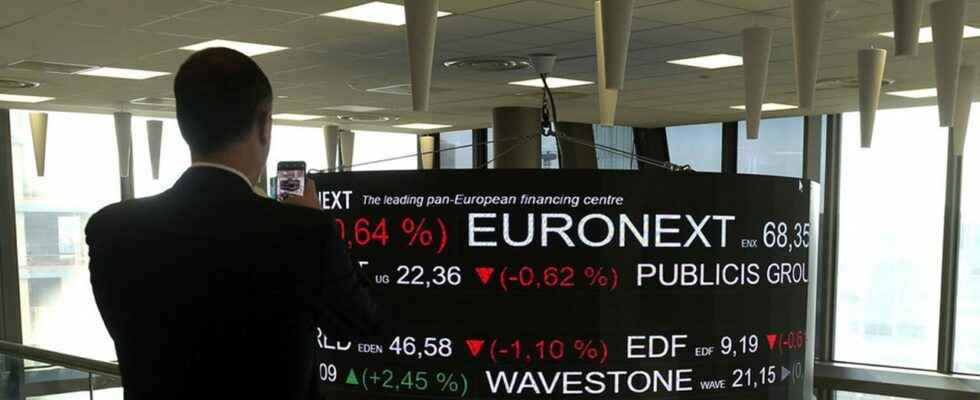(BFM Bourse) – The Paris Stock Exchange remains stuck in a downward trend after an already complicated weekend. Investors are showing their caution at the start of a week dominated by the start of the quarterly results season and numerous statistics, including those relating to inflation.
The Paris Stock Exchange is evolving on a cautious note, still undermined by a better than expected US employment report published at the end of last week (synonymous with a potentially more restrictive monetary policy from the Fed) to which is added a resurgence of tensions between Ukraine and Russia. The Moscow Stock Exchange also fell by nearly 12% in the first exchanges on Monday after the Russian bombings in Ukraine.
The calendar for the week also promises to be busy in terms of both business news and macroeconomics. The quarterly results season begins this week with LVMH’s turnover on Tuesday, before the accounts of American banks on Friday. The week will also be punctuated by inflation figures in the United States.
Shortly before 1:00 p.m., the main barometer of the tricolor rating lost 0.3% to 5,849.73 points after falling 1.2% at the end of the morning. On Friday, the CAC 40 had lost 1.17% but was credited with a gain of 1.8% on a weekly basis.
On Wall Street, trading will be sluggish on this Christopher Columbus Day holiday after a weekend marked by sharp declines in the major indices. The Nasdaq, for example, fell by almost 4% on Friday evening at the close.
Down 1% or more 52 times this year
“The S&P has fallen 1% or more 52 times this year, which represents the greatest negative volatility over one year since 2008”, notes on Twitter John Plassard, director at Mirabaud.
Investors will pay attention to the publication of the minutes (the “minutes”) of the last meeting of the US Federal Reserve, which could confirm the continuation of monetary tightening by the Fed. A scenario still favored by operators after the latest figures on US employment.
The US economy created 263,000 jobs last month, compared to 315,000 in August, but this is more than the 255,000 jobs created by the consensus. The unemployment rate, which was expected to be stable at 3.7%, finally fell by 0.2 points, to 3.5% at its lowest since February 2020. Growth in the average wage stood at 5% over one year. The employment situation is closely watched by the markets, as it is linked to the fight against inflation. The deterioration of the labor market not being as strong as expected, the chances of seeing the Fed review its rate strategy are therefore more than minimal.
The latest statements by the President of the San Francisco Fed also point in this direction, Mary Daly having warned the markets against any anticipation of a rate cut in 2023. The FedWatch tool now assigns a probability close to 80% (70 % ahead of the jobs report) for another Fed rate hike of 0.75 percentage points, versus 20% of investors betting on a 0.50 percentage point hike in early November.
Renault accelerates upwards, Casino still sees red
Renault shares are accelerating upwards (+3.7%), reacting to press reports that the French car manufacturer is in discussions with its partner Nissan about the restructuring of their alliance.
Casino is once again under pressure on the stock market (-4.1%) as Standard & Poor’s downgraded the Saint-Etienne distributor’s long-term credit rating this weekend. The rating agency points in particular to Casino’s difficulties in honoring its financial commitments, against the backdrop of deteriorating refinancing conditions.
The stocks exposed to the Chinese market are also in the wrong direction, including Remy Cointreau (-5.4%), just like Hermès (-1.6%), LVMH (-1.4%) or Kering (-1.3%) after a rise in Covid cases across the country.
These fears of new confinements in China are also weighing on oil prices. The barrel of Brent from the North Sea yielded 1.01% to 96.93 dollars while the WTI lost 0.90% to 91.81 dollars. On the side of the foreign exchange market, the dollar remained well oriented in the face of the Fed’s determination to fight inflation by further increases in its main key rate. The euro lost 0.33% to 0.9703 dollars and the pound sterling 0.15% to 1.1057 dollars despite the Bank of England’s announcement of new market support measures.
Sabrina Sadgui – ©2022 BFM Bourse
